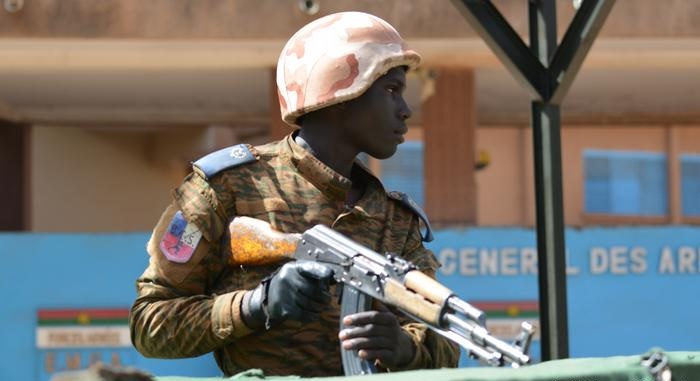
Gold mines in isolated areas of Africa’s Sahel region have become a welcome source of income for terrorists. Recent attacks in Burkina Faso show that security forces in the region are unable to gain the upper hand.
There is a gold rush in Africa’s Sahel region. A number of new mines have been opened there since a vein of gold was discovered in 2012. The Boungou mine in northeastern Burkina Faso, for instance, was opened between 2017 and mid-2018. But the region is also increasingly under threat from Islamists. Last week, at least 39 people were killed in attacks on buses carrying workers to Boungou; another 60 were injured.
Guiro Abdoul Kader was asleep when the attack occurred: “I was sleeping when I heard one of the windows shatter, at the same time I got a bullet in my back and I fell down. My colleague was next to me and he also lay down and he was on top of me. I told him he didn’t have any cover and that he should come further down. He said he was hit. He told me to do what I could and that he would stay a little higher up and that we were going to pray to God,” as Kader told Reuters news agency.
A gold mine for Islamists
The Boungou mine is operated by SEMAFO, a Canadian mining company. Speaking during a visit to Burkina Faso early last week, CEO Benoit Desormeaux said: “We have been with the Burkinabe people for many years. We want to see, together, how we can continue to collaborate whilst ensuring that we do so in a secure manner.”
Yet that security is now being called into question.
In its most recent report, the International Crisis Group, a nongovernmental organization, writes that Islamists first took control of gold mines in the Sahel in 2016.
The report claims that local security forces have been hesitant to protect rural areas, and that hesitation has had deadly consequences: “The authorities’ ability to regulate mining sites, even indirectly, crumbles as security deteriorates and armed groups challenge state authority in parts of the region. In this context, armed groups of all stripes can gain greater autonomy by exploiting gold resources, increasingly bypassing the state,” say the report’s authors.
The result has been that Islamists and other armed groups have taken control of the mines, using gold as a new source of income.
Disappointment five years after Compaore’s departure
Five years after longtime President Blaise Compaore was forced to leave office in the face of massive civil unrest, the current situation has left many here bitterly disappointed. “Look at how many people have been murdered, and how insecurity and terrorism have increased,” as activist Abdel Kader Traore told DW. “When you do, you will see that the current government is incapable of protecting the people and guaranteeing the territorial integrity of the country.” Traore is leading a movement calling for Compaore’s return.
Resignation is also spreading among some activists who called for Compaore’s ouster. One such activist is Marcel Tankoano from Movement April 21, better known by the acronym M21. “The people are disappointed. They feel cheated. When people call for Compaore’s return, it is a sign that the current government has failed,””says Tankoano. He adds that the new government, made up of people formally in Compaore’s inner circle, has proven to be just as corrupt as its predecessor.
A pact with the terrorists?
Terrorism was almost unknown in Burkina Faso before 2015. Now, armed groups have depopulated entire swaths of countryside. Some 300,000 people have been forced to flee , and that has had catastrophic consequences for agriculture and trade. Thousands of schools were also forced to close their doors.
But how was Burkina Faso able to escape that fate for so long? Speaking with DW, security expert Laurent Kibora says, “Blaise Compaore had good strategies.” He played the carrot-and-stick game, Kibora says by negotiating with all sides while at the same time assembling a lethal anti-terrorism unit. According to Kibora, many people believe Compaore may have even signed a non-aggression pact with Islamists.
Speaking during an interview with DW at the beginning of this year, Burkina Faso’s current president, Roch Marc Christian Kabore, was unmistakable in his assessment: “Those aren’t rumors; they are fact. Burkina Faso enjoyed years of peace because there was a deal,” said Kabore. “The new government was sworn in on January 12, 2016. Three days later, Burkina Faso experienced the largest terror attack in its history. Nothing before that date suggested any kind of terror threat.” Kabore also made clear that such deals would not be made as long as he is in power, saying, “It is a question of ethics.”
Meanwhile, the government is attempting to re-establish security in the country. “We are happy to announce that 400 schools have been reopened,” as Education Minister Stanislas Ouaro explained to DW during a recent visit to Germany. It is a humble start.
Skepticism among miners is also widespread. “No, I don’t think that I will go back,” says Joachim Ouedraogo, one of those wounded in the recent attack. “I don’t see what they could put in place to secure that road.” Ouedraogo added that security escorts did nothing to help protect him and his colleagues.
